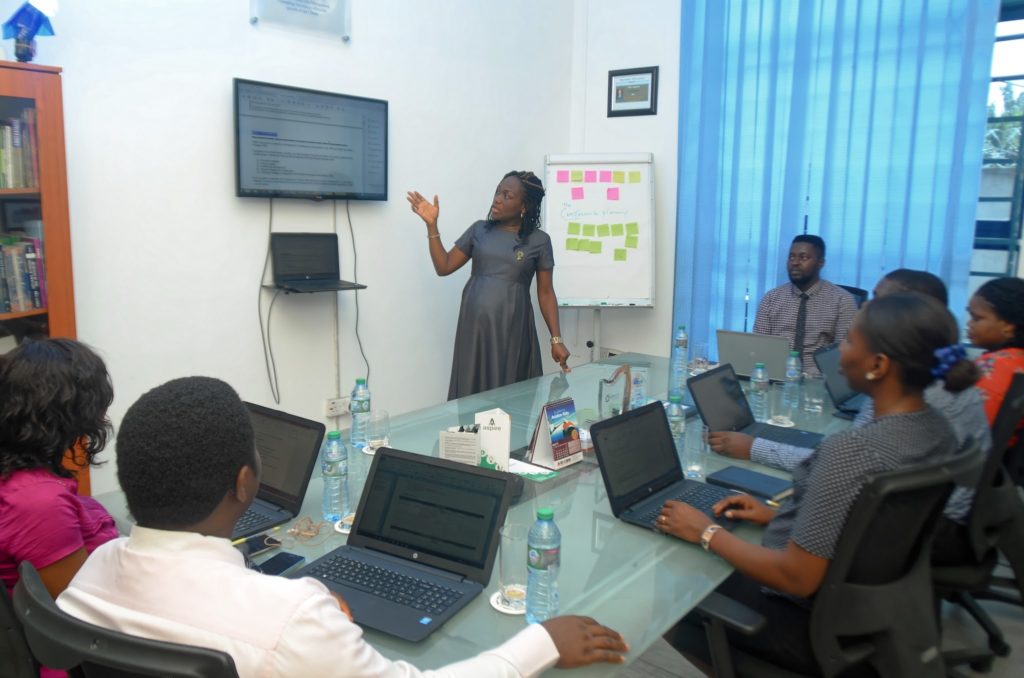
Besides improving agronomic practices in the various value chains, PIND’s economic development work helps provide smart grants to select Niger Delta-based small and medium-scale enterprises (SMEs). PIND’s approach to supporting small businesses is three-fold: strengthening the capacity of business service providers (BSPs) to offer linkages to finance as a value offering to SMEs; building partnerships with SME-friendly financial institutions; and facilitating linkages between the BSPs and partner financial institutions.

Edughom makes a presentation before clients at her office in Yenagoa, Bayelsa State. PIND’s Business Linkages team works with companies like hers to strengthen small businesses in the Niger Delta
Mrs. Edughom Hanson, Deputy Managing Director of Warri, Delta State-based small business consulting firm Wider Perspectives Limited that trained as a business service provider (BSP) under our Business Linkages program, believes that although availability of loan facilities differ from region to region, small businesses in the Niger Delta have challenges that will be familiar to their counterparts elsewhere in the country.
“There are general challenges that small and medium enterprises face everywhere, like lack of understanding of business development support or low capacity. The owner of the business may not know what he or she is doing, but usually they have a challenge of having the right staff, or in trying to be a one-man team. Another challenge is quality, there has to be continuous development to improve their quality delivery. And lastly access to finance.”
Mr. Bamidele Ayodele of DIC Limited, a Warri, Delta State-based BSP, also acknowledges the importance of access to finance, but believes that small businesses must also think beyond finance.
“Some businesses will say they have finance challenges, but we’ve discovered that if they had the right network, markets, etc, the finance will come on its own accord. We’re working to upgrade these businesses and enable them to fit into supply value chains of other large businesses.”
Business service providers like Mrs. Hanson and Mr. Ayodele trained with us in 2015 and have now begun to realize their potential. These BSPs provided business support services to 182 new SMEs, 44 of which are currently implementing their upgrade plans to improve their business and profitability. They also worked with the energy company Broad Global and Nigerian Liquified Natural Gas (NLNG) Company to support 170 cassava and poultry out-grower farmers to meet new markets for growth of their businesses. SMEs trained by PIND-supported BSPs reported a total of ₦204,555,088 worth of new sales by the end of the year, while seven of these SMEs obtained ₦141,782,240 in new loans, resulting in the creation of 130 new jobs. The BSPs also leveraged PIND’s partnership agreement with SME development financier GroFin to link four SMEs to funding to the tune of ₦61 million. Eight additional SMEs were recommended to GroFin for funding by 2 of our BSPs, so we expect that more will receive funding from GroFin in the coming year.

Ayodele Bamidele (center) of DIC Limited, a Warri-based, PIND-trained business service provider, visits a client who runs a bakery business in Warri, Delta State. His company and other BSPs supported 182 small businesses in 2016
“Before we weren’t as organized in our approach, but the diagnostic tools from PIND gave us more focus,” Ayodele tells us, referring to one of the SME diagnostic tools with which PIND trains BSPs. “ We’re like doctors checking baselines and vital signs. They have further increased my company’s capacity in terms of sourcing for clients. I now really understand the kind of interventions small businesses need to enable me add value. The trainings have given us a more scientific approach to what we do and how we proffer solutions. Our number of clients has increased, and our clients are more satisfied, as we have even had clients come back for more services since we got that training. It has improved our earnings.”
In 2016, PIND also used its Technical Assistance Fund (TAF) to support some SMEs who had funding constraints but whose activities have broader market system impact to upgrade their technologies, afford consulting services and improve working capital. Under TAF, we processed and approved grants for eight SMEs. Mrs. Hanson shares how working with PIND has also re-shaped her approach to business support.
“There were things that we ordinarily would do, that we had to re-think. For example, we were working hard to increase our client base, but realized that we would be better off focusing on getting the desired results for the small businesses we currently work with. Another thing is that small businesses don’t often have access to information. We started sharing more information on networking opportunities for our clients. These small businesses usually do not know they need these opportunities, but it dawns on them when they get them.”
Agriculture is a business, too, and PIND reinforces this by bringing the BSPs into the fold of its value chain work and broadening the BSPs knowledge. In 2016, PIND’s business linkages work also entailed linking FEMAS Microfinance Bank, whose original loan fund came from the UK Department for International Development (DFID)’s Market Development (MADE) Project, to 40 palm oil processors in Umuagwo, Imo State, to provide N100,000 to each of these processors to increase the scale of their businesses. Ayodele of DIC tells us that learning from PIND’s value chain work has greatly broadened his knowledge base.
“As a BSP I can’t be restricted. In banking where I was before, I was narrow in my approach, but now I can provide support in all different value chains and even business linkages. When you know this, you can even meet the needs of these companies. This has helped us understand what business development services actually entail. Because of my contacts, I can get qualified people to deliver what my client wants.”
PIND in 2016 trained another batch of nine business service providers, and we can’t wait to see the additional impact they will make.
